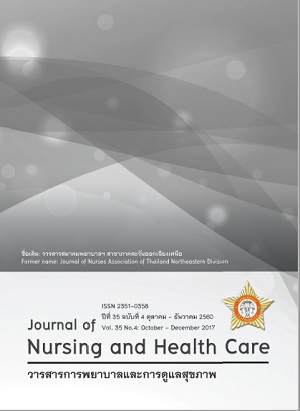สถานการณ์การเตรียมความพร้อมสู่การเป็นผู้สูงอายุของคนวัยแรงงาน Situation of Working-Age Persons’ Readiness for Aging
คำสำคัญ:
เตรียมความพร้อมสู่วัยสูงอายุ วัยสูงอายุ คนวัยแรงงาน, preparing for aging, aging, working-age people.บทคัดย่อ
การศึกษานี้เป็นระยะที่ 1 ของการวิจัยเชิงปฏิบัติการ มีวัตถุประสงค์เพื่อศึกษาสถานการณ์การเตรียมความพร้อมสู่การเป็นผู้สูงอายุของคนวัยแรงงาน ด้านร่างกาย จิตใจ สังคม เศรษฐกิจเงินออม ที่อยู่อาศัยและผู้ดูแล ทำการศึกษาในชุมชนแห่งหนึ่งจังหวัดกาฬสินธุ์ ผู้ร่วมดำเนินการวิจัยเลือกแบบเจาะจง ประกอบด้วย คนวัยแรงงาน อายุ 40-59 ปี จำนวน 20 คน และผู้มีส่วนเกี่ยวข้องรวม 10 คน เก็บรวบรวมข้อมูลโดยการสัมภาษณ์ สนทนากลุ่ม และสังเกตแบบมีส่วนร่วม วิเคราะห์ข้อมูลทั่วไปด้วยสถิติเชิงพรรณนา และวิเคราะห์ข้อมูลเชิงคุณภาพด้วยการวิเคราะห์เชิงเนื้อหา
ผลการศึกษาพบว่า ผู้ร่วมดำเนินการวิจัยมีอายุเฉลี่ย 50.30 ปี (S.D.= 4.62) เป็นเพศหญิง ร้อยละ 80.0 ทั้งหมดประกอบอาชีพทำนา ร้อยละ 75.0 มีรายได้น้อยกว่า 5,000 บาทต่อเดือน และร้อยละ 40.0 มีโรคประจำตัว ส่วนใหญ่มีพฤติกรรมการเตรียมความพร้อมด้านสังคมและผู้ดูแลค่อนข้างดี คือมีสัมพันธภาพที่ดีกับผู้อื่น ร่วมกิจกรรมชุมชนสม่ำเสมอ และวางแผนให้บุตรและคู่สมรสดูแลเมื่อเข้าสู่วัยสูงอายุ ขณะที่ด้านร่างกาย จิตใจ เศรษฐกิจเงินออม และที่อยู่อาศัย พบว่าส่วนใหญ่ยังไม่เห็นความจำเป็นและไม่ได้เตรียมความพร้อมในด้านนี้ เนื่องจากปัจจุบันร่างกายยังแข็งแรง สามารถทำงานหาเลี้ยงชีพได้ และมีที่อยู่อาศัยเป็นของตนเอง คนวัยแรงงานโดยเฉพาะกลุ่มอายุน้อยและไม่มีโรคประจำตัว มีพฤติกรรมการเตรียมความพร้อมไม่เหมาะสมในหลายประเด็น ได้แก่ รับประทานรสหวาน มัน เค็ม และอาหารดิบ สูบบุหรี่ ดื่มสุรา กาแฟและเครื่องดื่มชูกำลังเกินกำหนด ท่าทางการทำงานไม่เหมาะสม ขาดการออกกำลังกาย ไม่เข้ารับการตรวจสุขภาพ กังวลเรื่องอนาคต จัดการความเครียดไม่เหมาะสม ไม่วางแผนออมเงินและอาชีพสำรองในวัยสูงอายุ และไม่คิดปรับปรุงที่อยู่อาศัยสำหรับวัยสูงอายุ
พยาบาลชุมชนในพื้นที่ที่มีบริบทใกล้เคียง สามารถนำข้อมูลที่ได้จากผลการศึกษานี้ไปใช้วางแผนและออกแบบบริการสุขภาพ เพื่อส่งเสริมการเตรียมความพร้อมสู่วัยสูงอายุ ทำให้คนวัยแรงงานกลายเป็นผู้สูงอายุที่มีคุณภาพในอนาคต
This study was the first part of action research aimed to identify the situation of aging transition preparation among working age people including physical, psychological, social, financial, and caregiver and housing preparation. The study was conducted in one community of Kalasin province, Thailand. Purposive samples of 20 working age people at the age of 40-59 years and 10 people who had been involved in the working age people’ health care were study participants. The data was collected by interview, focus group, and participatory observation. The general information was analyzed using descriptive statistics and qualitative data was analyzed using content analysis.
Study findings showed that participants’ average age was 50.30 years (S.D.= 4.62). The majority of the participants was female (80.0%). All of the participants was farmers who mostly earned average income less than 5,000 baht (75.0%). Forty percentage of the participants had underlying disease. The majority of the participants well prepared for aging transition in terms of social and caregiver preparation as evidenced by having a good social relationship, planning for children and spouse to take care when getting older. However, physical, psychological, financial, and housing preparation were not considered necessary among this population due to physical strength, ability to earn for a living, and place to live at present. Working age people, especially those who were at younger age did not prepare well for aging transition for example inappropriate eating, smoking, and drinking behavior. Improper working posture, physical inactivity, and lack of routine health check-up were other evidences of no preparation for aging transition. Moreover, the participants had inappropriate stress management. They did not plan savings and earn future income when getting older. Lastly, the participants did not plan to renovate their houses to serve for aging changes.
The community nurses and health care personal can utilize the study findings to plan for assisting working-age people in preparation for aging transition. As a result, working-age people will be healthy aging population in the future.



